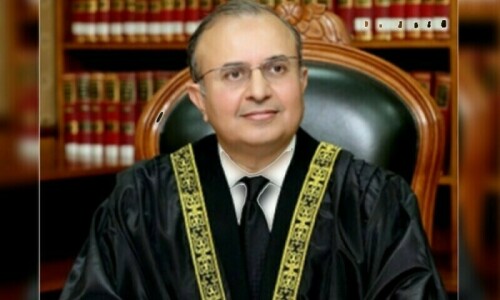LAHORE: Stepping up its efforts against terrorism, the Punjab government has decided to reform syllabi of seminaries and schools/colleges, a much-needed but hitherto ignored measure, map seminaries and Afghan refugees and introduce a ‘safe city’ project.
The decisions were announced by Chief Minister Shahbaz Sharif at a press conference here on Wednesday.
The province has already introduced laws against hate -- particularly takfiri -- speech, wall chalking and misuse of loudspeakers in mosques, and booked thousands of prayer leaders.
Know more: Punjab ahead of other provinces in anti-terror steps
Articles on religious tolerance and restraint would be made part of the syllabi of schools and seminaries, Mr Sharif said and added that most of the groundwork had been completed in this regard.
He said writing of plays and songs promoting harmony and tolerance would be encouraged as part of efforts to change the mindset of the society.
However, he insisted, the menace of terrorism could not be defeated overnight but it would take time as extremism had taken years to penetrate in the mindset of people.
Under the ‘safe city project’, he announced, a centralised command-and-control system would be established in major cities of the province to monitor different activities -- from a Mohallah fight or theft to a public meeting and acts of terror -- and activate the response.
Starting from Lahore, he said, CCTV cameras, vehicles scanners and other equipment would be installed at a cost of billions of rupees and the project would be taken to five other major towns later.
Mr Sharif said the provincial government would bear the cost of the project without seeking a single penny from the federal government.
At least 1,000 biometric machines had been procured and they would be use by raiding teams to verify nationality of suspects, he said.
“Hundred percent mapping of Afghan refugees and seminaries will be done in the province.”
Mr Sharif said the Lahore High Court had been requested to activate anti-terrorism courts and meetings were being regularly held to process and forward terrorism cases to military courts.
To fight terrorism, “besides the use of bullet (force), education, health, justice and economic activities will have to be promoted and poverty and unemployment eliminated,” the CM said and referred to different projects and schemes his government had launched in this respect.
Asked if the government would act against non-state actors, particularly the one from Lahore declared a terrorist at the international level, he merely said: “We are looking into the matter.”
Their (the Punjab government’s) focus was on individuals, not institutions, to ensure that “banned elements” did not start working under the name of a new organisation.
Asked if action would be taken against an anchorperson and other staff of a private TV channel for airing takfiri remarks in a talk show under the law being used against thousands of prayer leaders, he confined himself to appealing to the media to play a responsible role in the fight against terrorism and extremism.
In reply to another query, he said cases of 400 foreign students of seminaries, whose visas had expired, had been sent to the federal government after whose approval they would be deported.
Published in Dawn, February 26th, 2015
On a mobile phone? Get the Dawn Mobile App: Apple Store | Google Play














































